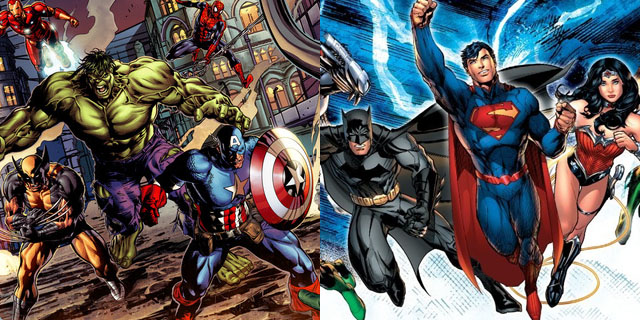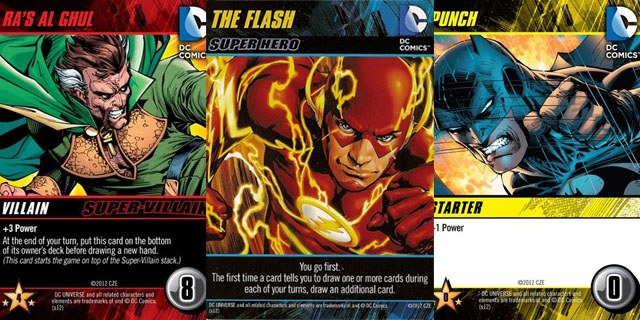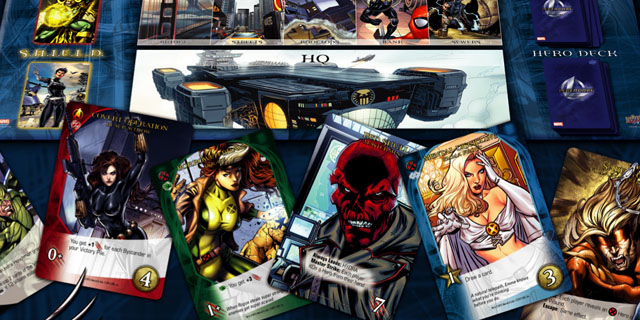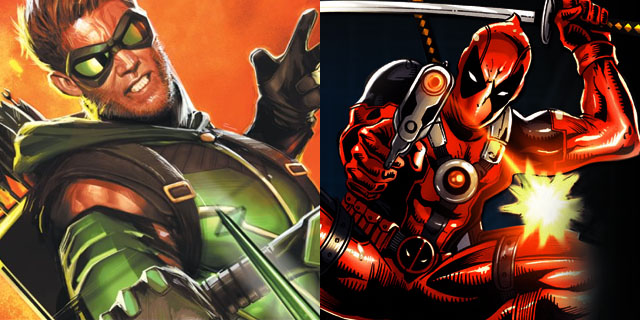
The Marvel-vs.-DC comic publisher rivalry has played out for decades on the printed page and subsequent adaptations. Movies, animation (both features and series), video games, action figures and even various role-playing game systems have all drawn from the deep rosters of both companies’ history of creativity. In 2012, two deck-building games were released: one Marvel (published by Upper Deck), one DC (published by Cryptozoic). I have only recently been able to play them both, partially thanks to recent expansions, and wanted to compare the two head-to-head as is contractually required of Internet fanboys.
The first I played was the plainly-named DC Comics Deck-Building Game. Players are randomly assigned a superhero identity that gives them a unique ability when playing and will potentially influence decisions as to which cards they acquire from the central line-up. The game only uses one currency: power. This simplifies choices somewhat, without a bunch of wrong-typed cards junking up the line-up like monsters in Ascension. Also unlike Ascension, the cards in the line-up do not replace themselves until the end of a player’s turn. This prevents lucky topdecks from allowing a player to chain purchases, but also ensures that you know all of your options when your turn begins.
If you accumulate enough power on your turn, you have the option of defeating the current super-villain. Doing so will earn you a bunch of points and add a powerful card to your deck, and defeating the last super-villain is one way to end the game (along with exhausting the line-up deck). However, when cards are refilled after a player’s turn, a new super-villain is turned face-up and attacks all of the players unless they have defenses in their hands. Players may also attack other players via the cards they play, usually acquired villain cards. Defenses are important, but you won’t always have them when you need them so you will probably take some weakness cards. Weaknesses deduct from your final score, so you want to either avoid or eliminate them whenever possible.

While the game can obviously be modified by its own expansions, it shares the same design as other Cryptozoic “Cerberus Engine” games, which at present consists of only the Capcom Street Fighter Deck-Building Game. If you ever wanted Batman and the Joker to mix it up with Ryu and M. Bison, here’s your chance. Actually mixing sets — even other DC expansions — is a little more awkward than it sounds, due to built-in synergies within releases that don’t really cross over, but it’s enough variety to keep things interesting.
Whether you use expansions or not, setting up a game of Legendary: A Marvel Deck Building Game is a bit more complicated than its DC counterpart. Players choose a selection of heroes from the available options, then combine those cards into a hero deck. A Mastermind villain is chosen along with a random Scheme and a separate villain deck constructed from various groups, henchmen, Master Strikes, Scheme Twists and Bystanders. The actual numbers of each group added depend on the number of players.
Legendary uses two types of currency: influence to buy new hero cards from HQ, and combat to defeat villains rampaging through The City. While the HQ line-up is always full of heroes and refreshes constantly, new Villains only enter the city one at a time, at the beginning of each player’s turn. New villains push preexisting villains down one slot, and if they get pushed off the row the villain escapes and the players suffer the consequences. As with the DC game, players also have the option of pummeling the Mastermind should they have enough combat ability and defeating the Mastermind enough times is the only way the players can emerge victorious.

That’s right, Legendary is semi-cooperative. The Scheme selected for the current game dictates how the game can end in defeat for the players, usually related to the number of Scheme Twists that are revealed from the villain deck. Should the players manage to work together enough to defeat the Mastermind, they then count up the points on their defeated villains and rescued bystanders to see who officially wins the game (hero cards are very rarely worth points themselves). It’s an interesting twist to the usual deck-building formula, but perfectly fitting given the way most Marvel team-ups go even if the idea of certain heroes (like Captain America) actually “keeping score” might seem incongruous.
Of the two, I prefer Legendary. Not all of that is my general bias towards Marvel, either. The DC game just feels too much like every other deck-building game, with the exception of the non-refreshing buy row. It’s the only deck-building game I’ve ever seen do this, including other Cryptozoic releases like Penny Arcade: Gamers vs. Evil, and it just feels awkward. I don’t think that’s the only problem with the DC game, though. Constant attacks hamper other players and make turns less efficient than they would normally be, and the special abilities of each player’s super-hero can create wildly imbalanced decks depending on how the line-up deck is shuffled. I’m also not a huge fan of the single currency, as “big money” is usually the go-to strategy in such games (see also: Dominion).
Which isn’t to say that Legendary is perfect, either. Every card in each hero’s deck uses the exact same art, making it almost impossible to tell which one does what without actually reading them. Sure, there are some color-coded types (where DC uses actual card types with distinct art) but that’s not much of a help. Even the selection of heroes and villains will have an influence over how the game plays out, as some decks might not contain the right type of cards to properly deal with certain enemies. There also doesn’t seem to be a lot of options for culling inferior cards (and Wounds) from your deck, but that again is dependent on the specific mix of cards involved.

What both games do fairly well is give each hero a unique feel. The DC game mostly does this through the super-hero identity cards given to each player, modifying generic mechanics to suit that character’s strength. Each individual hero’s deck in Legendary has a self-contained theme, which makes specializing in a given hero a powerful strategy if the shuffle (and other players) allows it. But in the end, I think Legendary better captures the “heroes vs. villains” conflict by forcing the players to focus on the task at hand and not just playing “multiplayer solitaire” like a lot of other games in this genre.
Honestly, I’d rather play Sentinels of the Multiverse if I need my super-hero action itch scratched. I don’t think a deck-builder is the right medium for the story that wants to inherently be told here. But I readily admit that Sentinels isn’t for all groups, so if deck-builders are your thing, I’d give one of these a shot.
DC Comics Deck-Building Game retails for $40. Legendary: A Marvel Deck Building Game retails for $60. Both games support up to five players (Legendary also has solo rules) and play out in about 45 minutes.



















